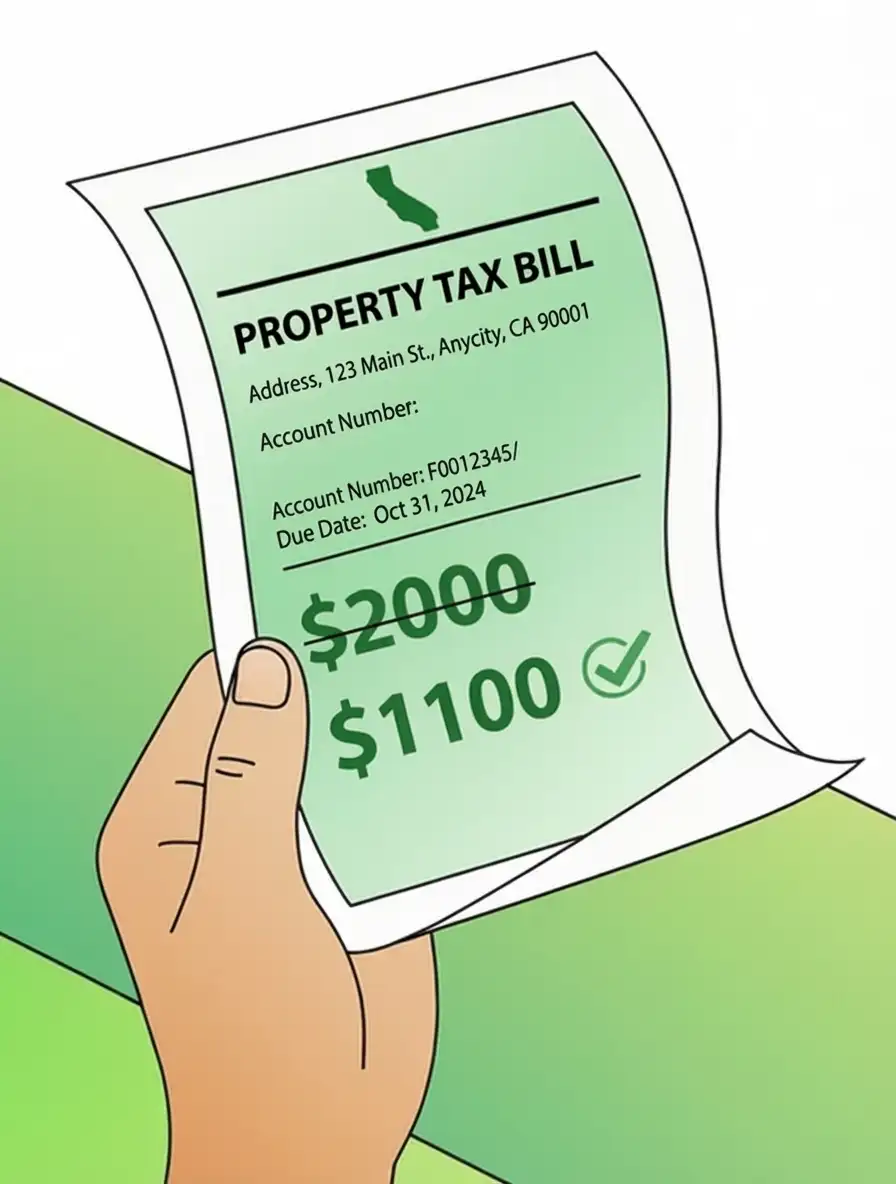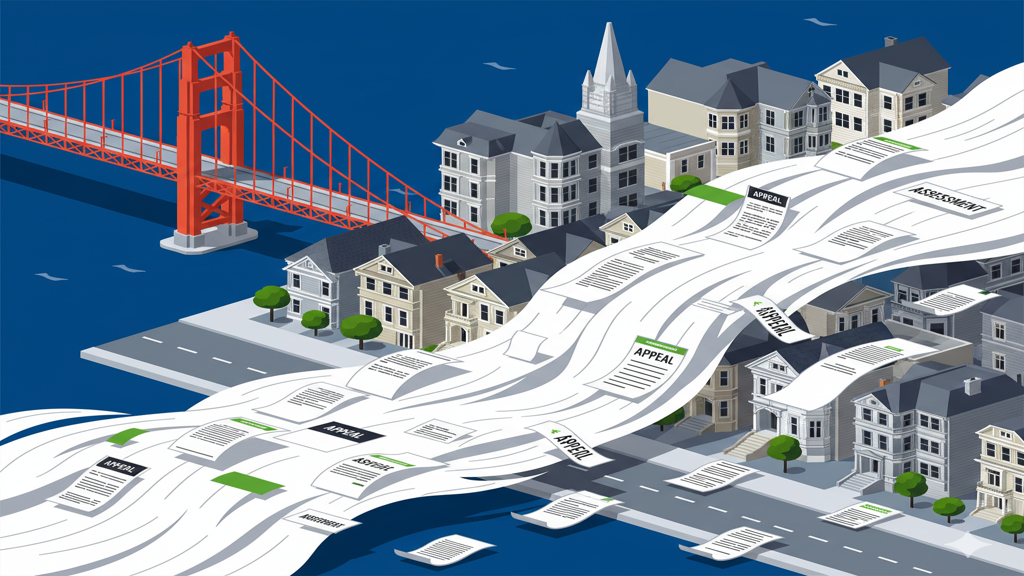San Francisco County homeowners overpay $1,250/year due to assessment errors. We fix that.
✔ 100% Done-for-You - We handle everything
✔ Licensed Tax Pros - California experts
✔ Only Pay If We Win - 25% contingency

If you just opened your San Francisco County property tax bill and felt that familiar punch to the gut, you’re not alone.
With the median home value around $1.4 million and effective tax rates hitting 0.75%, many homeowners are paying $8,000–$12,000 annually – and a shocking number are overpaying by hundreds or thousands due to assessment errors. The worst part? Most people just accept it and write the check, year after year.
Here’s what most San Francisco County homeowners don’t realize: your assessment can be wrong. The Assessor’s Office processes over 500,000 properties, and mistakes happen constantly. Properties in neighborhoods like the Mission, Richmond, and Sunset often get lumped together despite significant differences in condition, size, or recent sales. We’ve seen $800,000 homes assessed like $1.2 million properties simply because they’re on the same block.
Let’s talk numbers that matter to your wallet. If your home is overassessed by just $100,000 (common in hot markets), you’re overpaying roughly $750 per year. Over ten years, that’s $7,500 – enough for a nice vacation or significant home improvement. We recently helped a Noe Valley homeowner reduce their assessment by $180,000, saving them $1,350 annually. That’s real money staying in their pocket instead of going to the county.
The appeals process exists for a reason, but it’s designed to intimidate regular homeowners. You need comparable sales data, property condition reports, and knowledge of assessment methodology. Most people take one look at the paperwork and give up. That’s exactly what the system counts on – your frustration and lack of time working in their favor.

San Francisco County’s unique market creates perfect conditions for assessment errors. Tech booms and busts create wild valuation swings that assessors struggle to track accurately. Properties near transit lines get blanket increases without considering individual factors. Older homes in gentrifying areas like the Outer Sunset or Visitacion Valley often get assessed based on newer construction nearby, ignoring needed repairs or outdated systems.
The Assessor’s Office also relies heavily on automated valuation models that miss crucial details. Your home might need a new roof, have foundation issues, or lack the upgrades of comparable sales – but the computer doesn’t know that. These oversights add up to real money coming out of your pocket unnecessarily.
Here’s how simple we make it: you spend five minutes uploading your assessment notice and property details. We spend the next 3–4 months building your case, gathering comparable sales, documenting property conditions, and presenting to the Assessment Appeals Board. You get updates along the way, but the heavy lifting is completely off your plate. Most clients forget they even filed until we call with good news about their tax reduction.
Our licensed professionals know exactly what the Appeals Board looks for because we’ve presented hundreds of cases. We understand which comparables carry weight, how to document property issues effectively, and what arguments resonate with hearing officers. This isn’t our side hustle – it’s what we do full-time, and our 94% success rate proves the system works when you know how to work it.
The September 15th deadline isn’t negotiable, and every day you wait costs money. But starting your appeal takes less time than reading this page. Upload your assessment notice, answer a few questions about your property, and we’ll analyze whether you have a strong case. If we don’t think we can save you money, we’ll tell you upfront – no charge, no obligation. If we do see savings potential, you’ll know exactly what to expect and when.

Signup to have TaxDrop take care of your assessment protest for you. It takes less than 3 minutes to enroll and there is no fee if we don't win.
Step 1: Review Your Assessment Receive Assessed Value Notice by July 1 showing property valuation.
Step 2: File Your Appeal Submit Assessment Appeal Application with supporting evidence between July 2 – September 15.
Step 3: Application Review Clerk reviews application and schedules hearing (60-90 days after filing).
Step 4: Hearing Preparation Gather comparable sales data, appraisals, and documentation.
Step 5: Appeals Board Hearing Present case to Board panel (typically 4-9 months after filing).
Step 6: Decision & Adjustment Board issues written decision; if successful, assessed value reduced and tax refund issued (30-60 days after hearing).
Filing Deadlines:
The deadline to file a property tax appeal in San Francisco County is September 15th, with the filing period opening July 2nd each year. This 75-day window could save homeowners thousands annually by challenging overassessed property values. Missing this deadline means waiting until the next tax year to appeal your assessment. Check if your San Francisco property qualifies for tax savings before the deadline passes.
You can check your San Francisco County property's assessed value online at sfassessor.org using your address or parcel number. This free lookup shows your current assessed value, taxable value, and any exemptions applied. Comparing your assessed value to recent sales of similar homes in San Francisco helps determine if you're overpaying. Enter your address to see if your assessment appears too high.
Property tax appeals in San Francisco County typically save homeowners $2,000 to $8,000 annually, with some saving over $15,000 per year depending on the property's value and overassessment amount. This translates to 10-30% reductions in property tax bills for successful appeals. The average San Francisco home assessed at $1.5 million could save $3,600 yearly with a 20% assessment reduction. Calculate your potential savings based on your property's current assessment.
Approximately 60-70% of property tax appeals in San Francisco County result in assessment reductions when filed with proper evidence and documentation. Professional services achieve even higher success rates of 75-85% compared to self-filed appeals. The California State Board of Equalization reports that San Francisco County grants partial or full reductions on most well-documented appeals. Many homeowners use professional services to maximize their chances of success.
Any property owner in San Francisco County can file a property tax appeal, including homeowners, landlords, commercial property owners, and business owners who own real estate. You must own the property as of January 1st of the tax year being appealed. Both residential properties in San Francisco and commercial properties throughout the county are eligible for assessment appeals. See if your property type qualifies for a tax appeal.
The property tax appeal process in San Francisco County typically takes 6-12 months from filing to final decision, with most cases resolved within 8 months. Simple residential appeals may be decided faster, while complex commercial cases can take up to 18 months. The San Francisco Assessment Appeals Board schedules hearings throughout the year, with decisions issued 30-60 days after your hearing. TaxDrop handles the entire timeline and keeps you updated on your case's progress.
Professional property tax appeal services in San Francisco County achieve 75-85% success rates compared to 40-50% for self-filed appeals, making professional help worthwhile for most homeowners. Professionals understand local assessment practices, have access to comparable sales data, and know how to present evidence effectively. The time investment for DIY appeals often exceeds 20-30 hours of research and preparation. Get a free assessment to see if professional help makes sense for your situation.
Not appealing an incorrect property tax assessment in San Francisco County means overpaying $2,000-$8,000 annually for years until the next reassessment or sale. California's Proposition 13 limits assessment increases to 2% yearly, so overassessments compound over time without intervention. Many San Francisco homeowners unknowingly overpay because they assume assessments are always accurate. Check if you're overpaying based on recent comparable sales in your neighborhood.
Your San Francisco County property may be overassessed if similar homes in your neighborhood sold for 10-15% less than your assessed value within the past year. Other red flags include recent renovations that weren't completed, declining neighborhood values, or property damage not reflected in your assessment. The median home price in San Francisco dropped in certain areas during 2022-2023, creating appeal opportunities. Compare your assessment to recent sales data instantly.